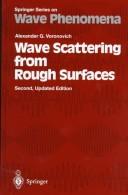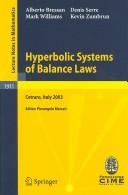| Listing 1 - 4 of 4 |
Sort by
|
Book
ISBN: 0387125620 0387178295 0387178287 0387161864 9780387178288 9780387178295 9780387161860 9780387125626 Year: 1989 Publisher: Berlin: Springer,
Abstract | Keywords | Export | Availability | Bookmark
 Loading...
Loading...Choose an application
- Reference Manager
- EndNote
- RefWorks (Direct export to RefWorks)
Radio waves --- Stochastic processes --- Ondes radioélectriques --- Processus stochastiques --- Mathematics --- Mathématiques --- Ondes radioélectriques --- Mathématiques --- Radio waves - Mathematics

ISBN: 3540574395 0387574395 3642975461 3642975445 9783540574392 9780387574394 Year: 1994 Volume: 17 Publisher: Berlin: Springer,
Abstract | Keywords | Export | Availability | Bookmark
 Loading...
Loading...Choose an application
- Reference Manager
- EndNote
- RefWorks (Direct export to RefWorks)
Waves --- Scattering (Physics) --- Surfaces (Physics) --- Mathematics --- 543.08 --- 517.98 --- Analytical measurement --- Functional analysis and operator theory --- 517.98 Functional analysis and operator theory --- 543.08 Analytical measurement --- Waves - Mathematics --- Scattering (Physics) - Mathematics --- Surfaces (Physics) - Mathematics

ISBN: 9783540721864 354072186X 9786610865048 1280865040 3540721878 Year: 2007 Publisher: Berlin, Germany ; New York, New York : Springer,
Abstract | Keywords | Export | Availability | Bookmark
 Loading...
Loading...Choose an application
- Reference Manager
- EndNote
- RefWorks (Direct export to RefWorks)
The present Cime volume includes four lectures by Bressan, Serre, Zumbrun and Williams and an appendix with a Tutorial on Center Manifold Theorem by Bressan. Bressan’s notes start with an extensive review of the theory of hyperbolic conservation laws. Then he introduces the vanishing viscosity approach and explains clearly the building blocks of the theory in particular the crucial role of the decomposition by travelling waves. Serre focuses on existence and stability for discrete shock profiles, he reviews the existence both in the rational and in the irrational cases and gives a concise introduction to the use of spectral methods for stability analysis. Finally the lectures by Williams and Zumbrun deal with the stability of multidimensional fronts. Williams’ lecture describes the stability of multidimensional viscous shocks: the small viscosity limit, linearization and conjugation, Evans functions, Lopatinski determinants etc. Zumbrun discusses planar stability for viscous shocks with a realistic physical viscosity, necessary and sufficient conditions for nonlinear stability, in analogy to the Lopatinski condition obtained by Majda for the inviscid case.
Differential equations, Hyperbolic --- Shock waves --- Equations différentielles hyperboliques --- Congresses. --- Mathematics --- Congrès --- Differential equations, Hyperbolic -- Congresses. --- Electronic books. -- local. --- Shock waves -- Mathematics -- Congresses. --- Calculus --- Physical Sciences & Mathematics --- Mathematics. --- Partial differential equations. --- Numerical analysis. --- Continuum physics. --- Partial Differential Equations. --- Classical Continuum Physics. --- Numerical Analysis. --- Classical field theory --- Continuum physics --- Physics --- Continuum mechanics --- Mathematical analysis --- Partial differential equations --- Math --- Science --- Shock (Mechanics) --- Waves --- Differential equations, partial. --- Classical and Continuum Physics.
Book
ISBN: 9781846288524 1846288517 9781846288517 1849966591 9786611960247 1281960241 1846288525 Year: 2008 Publisher: London : Springer,
Abstract | Keywords | Export | Availability | Bookmark
 Loading...
Loading...Choose an application
- Reference Manager
- EndNote
- RefWorks (Direct export to RefWorks)
The use of various types of wave energy is an increasingly promising, non-destructive means of detecting objects and of diagnosing the properties of quite complicated materials. An analysis of this technique requires an understanding of how waves evolve in the medium of interest and how they are scattered by inhomogeneities in the medium. These scattering phenomena can be thought of as arising from some perturbation of a given, known system and they are analysed by developing a scattering theory. This monograph provides an introductory account of scattering phenomena and a guide to the technical requirements for investigating wave scattering problems. It gathers together the principal mathematical topics which are required when dealing with wave propagation and scattering problems, and indicates how to use the material to develop the required solutions. Both potential and target scattering phenomena are investigated and extensions of the theory to the electromagnetic and elastic fields are provided. Throughout, the emphasis is on concepts and results rather than on the fine detail of proof; a bibliography at the end of each chapter points the interested reader to more detailed proofs of the theorems and suggests directions for further reading. Aimed at graduate and postgraduate students and researchers in mathematics and the applied sciences, this book aims to provide the newcomer to the field with a unified, and reasonably self-contained, introduction to an exciting research area and, for the more experienced reader, a source of information and techniques.
Mathematics. --- Functional Analysis. --- Operator Theory. --- Partial Differential Equations. --- Functional analysis. --- Operator theory. --- Differential equations, partial. --- Mathématiques --- Analyse fonctionnelle --- Théorie des opérateurs --- Scattering (Mathematics). --- Scattering (Physics) -- Mathematics. --- Waves -- Mathematics. --- Scattering (Physics) --- Scattering (Mathematics) --- Waves --- Scattering theory (Mathematics) --- Atomic scattering --- Atoms --- Nuclear scattering --- Particles (Nuclear physics) --- Scattering of particles --- Wave scattering --- Scattering --- Physics. --- Partial differential equations. --- Optics. --- Electrodynamics. --- Optics and Electrodynamics. --- Dynamics --- Physics --- Light --- Partial differential equations --- Functional analysis --- Functional calculus --- Calculus of variations --- Functional equations --- Integral equations --- Natural philosophy --- Philosophy, Natural --- Physical sciences --- Cycles --- Hydrodynamics --- Benjamin-Feir instability --- Boundary value problems --- Differential equations, Partial --- Scattering operator --- Collisions (Nuclear physics) --- Particles --- Collisions (Physics) --- Classical Electrodynamics.
| Listing 1 - 4 of 4 |
Sort by
|

 Search
Search Feedback
Feedback About UniCat
About UniCat  Help
Help News
News